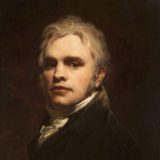Halloween is a season in America. It’s part infantilization. Adults who seek to live forever cling to a children’s holiday. But it is also part of the changing superstitious character of our country.
We have fallen into a dark age, not unlike the dark age of the second half of the 17th century and the early part of the 18th century, before the birth of the revolutionary generation.
Parents battle critical race theory (CRT) at school board meetings. CRT is an off-shoot of critical legal theory, which is a counter to legal realism, which is in turn a pragmatic rejection of natural law interpretations.
Natural law in America is a compact theory. A people by consent form a nation—the celestial spark in each of us fuses into the bright light of a specific people with a specific regime—and we agree to methods for legislating to be interpreted by courts in accordance with the plain intention of the law’s makers, the people.
Legal realism, birthed by Oliver Wendell Holmes Jr., criticizes this to say judges do and ought to interpret law to produce results that they find practical and beneficial.
Critical legal theory, birthed by Marxism and derivative of postmodern deconstructionism, criticizes legal realism to say custom, law, rules, and decisions follow power structures—namely capital. The reform of legal structures requires their deconstruction.
Critical race theory, birthed by critical legal theory, says that the chief exploitation of capital or power is race and thus customs, laws, rules, and decisions support power structures that are based on the oppression of minorities.
Marx is right, up to a point. Opinion is a reaction to economic circumstances and capital is clever. It was clever enough to get the money; it doesn’t need to be told to keep it. It is clever enough to fashion elaborate stories—a faith—to build earthworks around itself. Ramparts: Race. Trenches: Gender. Stockade Wall: Feminism. Crenelations: Immigrants. Blockhouses: LGBTQ+.
Capital doesn’t have to be too clever. It just has to react in its interests and to the churning and unstable opinions of Americans. Capital doesn’t build the woke religion. It exploits it, builds a fortress from it, incrementally and opportunistically,in the same way a head of a Southern plantation would twist his Christian duties to elevate and distort the duties of bondsmen and the stories of Japheth, Shem, and Ham.
Scarlett O’Hara got to believe those who toil uncompensated do so for the advancement of civilization, for her benefit, their benefit, and the world’s benefit. Ashley Wilkes got to believe that while he was away fighting Yankees, if all did their God mandated duty, there would be no uprising. No one needs to tell the O’Haras and the Wilkeses that this must be a central teaching of the Bible. They’d believe anything that justified their rights.
And so it is for modern capital. Capital didn’t invent wokeism, but it gravitates towards a particular interpretation of wokeism, which mutes criticism of themselves and diverts attention from capital’s conspicuously wicked practices. Thus it coopts the nominally Marxist and radicalized leftist elements to attack the middle class rather than capital itself.
Like the Old South’s interpretation of Biblical passages on the duty of bondsmen and the stories of Japheth, Shem, and Ham, the substance of wokeism is derivative of and backfill for the collapse of Christianity.
It is redemptive. Belief in and vocalization of its general tenets redeems past sins, particularly acquisitiveness. It is oriented towards the meek and poor, i.e., minorities, real and fantastical. Howsoever you hate yourself for the least of your brothers so you hate yourself for me. It picks up where Protestant priesthood of all believers leaves off. “My truth” is an essential component of critical theory in practice, and “my truth” is just a restatement of justification by faith.
All this satisfies a craving for superstition, creating vast imperceptible—unexaminable—concepts of systemic oppression. It is everywhere, felt but unseen, except in its effects. Like the Devil it is there in front of you all the time, yet hidden.
Everywhere there are witches and warlocks, working magic, and their trial and condemnation will require the relaxation of the old and established methods and processes of justice.
Wokeism proposes a change in distributive justice mostly in honors; actually distributing money—or just giving unskilled labor a fair shot at earning—offends wokeism’s patron, capital. Yesterday was Columbus Day, or for the woke, Indigenous Peoples’ Day. Not 1776, but 1619.
There are at least two monopolies working together, woke thought and media-tech-finance.
This version of distributive justice—the reallocation of honors—reflects a dependency of each on the other. Capital rewards wokeism; wokeism defends capital; capital rewards wokeism further; wokeism defends capital yet again, each shaping the other but always in a way that supports the privileges and concentration of capital.

